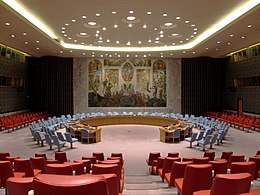
A | B | C | D | E | F | G | H | CH | I | J | K | L | M | N | O | P | Q | R | S | T | U | V | W | X | Y | Z | 0 | 1 | 2 | 3 | 4 | 5 | 6 | 7 | 8 | 9
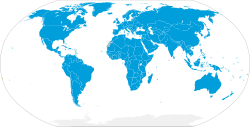 | |||||||
| Headquarters | 760 United Nations Plaza, Manhattan, New York City, United States (international zone) | ||||||
| Official languages | |||||||
| Type | Intergovernmental organization | ||||||
| Membership | 193 member states 2 observer states | ||||||
| Leaders | |||||||
| António Guterres | |||||||
| Amina J. Mohammed | |||||||
| Dennis Francis | |||||||
| Paula Narváez | |||||||
| Establishment | |||||||
• UN Charter signed | 26 June 1945 | ||||||
• Charter entered into force | 24 October 1945 | ||||||
| |||||||
The United Nations (UN) is a diplomatic and political[2] international organization whose stated purposes are to maintain international peace and security, develop friendly relations among nations, achieve international cooperation, and serve as a centre for harmonizing the actions of nations.[3] It is the world's largest international organization.[4] The UN is headquartered in New York City (in the United States, but with certain extraterritorial privileges), and the UN has other offices in Geneva, Nairobi, Vienna, and The Hague, where the International Court of Justice is headquartered at the Peace Palace.
The UN was established after World War II with the aim of preventing future world wars, and succeeded the League of Nations, which was characterized as ineffective.[5] On 25 April 1945, 50 nations met in San Francisco, California for a conference and started drafting the UN Charter, which was adopted on 25 June 1945. The charter took effect on 24 October 1945, when the UN began operations. The UN's objectives, as defined by its charter, include maintaining international peace and security, protecting human rights, delivering humanitarian aid, promoting sustainable development, and upholding international law.[6] At its founding, the UN had 51 member states; as of 2023[update], it has 193 – almost all of the world's sovereign states.[7]
The UN's mission to preserve world peace was complicated in its early decades due in part to Cold War tensions that existed between the United States and Soviet Union and their respective allies. Its mission has included the provision of primarily unarmed military observers and lightly armed troops charged with primarily monitoring, reporting and confidence-building roles.[8] UN membership grew significantly following widespread decolonization in the 1960s. Since then, 80 former colonies have gained independence, including 11 trust territories that had been monitored by the Trusteeship Council.[9] By the 1970s, the UN's budget for economic and social development programmes vastly exceeded its spending on peacekeeping. After the end of the Cold War in 1991, the UN shifted and expanded its field operations, undertaking a wide variety of complex tasks.[8]
The UN has six principal operational organizations: the General Assembly, the Security Council, the Economic and Social Council, the International Court of Justice, the UN Secretariat, and the Trusteeship Council, although the Trusteeship Council has been inactive since 1994. The UN System includes a multitude of specialized agencies, funds, and programmes, including the World Bank Group, the World Health Organization, the World Food Programme, UNESCO, and UNICEF. Additionally, non-governmental organizations may be granted consultative status with the Economic and Social Council and other agencies.
The UN's chief administrative officer is the secretary-general, currently Portuguese politician and diplomat António Guterres, who began his first five year-term on 1 January 2017 and was re-elected on 8 June 2021. The organization is financed by assessed and voluntary contributions from its member states.
The UN, its officers, and its agencies have won many Nobel Peace Prizes, though other evaluations of its effectiveness have been mixed. Some commentators believe the organization to be an important force for peace and human development, while others have called it ineffective, biased, and corrupt.
History
Background (pre-1941)
In the century prior to the UN's creation, several international organizations such as the International Committee of the Red Cross were formed to ensure protection and assistance for victims of armed conflict and strife.[10]
During World War I, several major leaders, especially American President Woodrow Wilson, advocated for a world body to guarantee peace. The winners of the war, the Allies, met to decide on formal peace terms at the Paris Peace Conference. The League of Nations was approved, and started operations, but the United States never joined. On 10 January 1920, the League of Nations formally came into being when the Covenant of the League of Nations, ratified by 42 nations in 1919, took effect.[11] The League Council acted as an executive body directing the Assembly's business. It began with four permanent members—the United Kingdom, France, Italy, and Japan.
After some limited successes and failures during the 1920s, the League proved ineffective in the 1930s, as it failed to act against the Japanese invasion of Manchuria in 1933. Forty nations voted for Japan to withdraw from Manchuria but Japan voted against it and walked out of the League instead of withdrawing from Manchuria.[12] It also failed to act against the Second Italo-Ethiopian War, when calls for economic sanctions against Italy failed. Italy and other nations left the League.
When war broke out in 1939, the League closed down.[13]
Declarations by the Allies of World War II (1941–1944)

The first step towards the establishment of the United Nations was the Inter-Allied Conference that led to the Declaration of St James's Palace on 12 June 1941.[14][15] By August 1941, American President Franklin Roosevelt and British Prime Minister Winston Churchill had drafted the Atlantic Charter; which defined goals for the post-war world. At the subsequent meeting of the Inter-Allied Council in London on 24 September 1941, the eight governments in exile of countries under Axis occupation, together with the Soviet Union and representatives of the Free French Forces, unanimously adopted adherence to the common principles of policy set forth by Britain and the United States.[16][17]
Roosevelt and Churchill met at the White House in December 1941 for the Arcadia Conference. Roosevelt, considered a founder of the UN,[18][19] coined the term United Nations to describe the Allied countries. Churchill accepted it, noting its use by Lord Byron.[20][21] The text of the Declaration by United Nations was drafted on 29 December 1941, by Roosevelt, Churchill, and Harry Hopkins. It incorporated Soviet suggestions but included no role for France. One major change from the Atlantic Charter was the addition of a provision for religious freedom, which Stalin approved after Roosevelt insisted.[22][23]
Roosevelt's idea of the "Four Powers", referring to the four major Allied countries, the United States, the United Kingdom, the Soviet Union, and China, emerged in the Declaration by the United Nations.[24] On New Year's Day 1942, Roosevelt, Churchill, the Soviet Union's former Foreign Minister Maxim Litvinov, and the Chinese Premier T. V. Soong signed the "Declaration by United Nations",[25] and the next day the representatives of twenty-two other nations added their signatures. During the war, the United Nations became the official term for the Allies. In order to join, countries had to sign the Declaration and declare war on the Axis powers.[26]
The October 1943 Moscow Conference resulted in the Moscow Declarations, including the Four Power Declaration on General Security which aimed for the creation "at the earliest possible date of a general international organization". This was the first public announcement that a new international organization was being contemplated to replace the League of Nations. The Tehran Conference followed shortly afterwards at which Roosevelt, Churchill and Joseph Stalin, the leader of the Soviet Union, met and discussed the idea of a post-war international organization.
The new international organisation was formulated and negotiated amongst the delegations from the Allied Big Four at the Dumbarton Oaks Conference from 21 September to 7 October 1944. They agreed on proposals for the aims, structure and functioning of the new organization.[27][28][29] It took the conference at Yalta in February 1945, and further negotiations with the Soviet Union, before all the issues were resolved.[30]
Founding (1945)
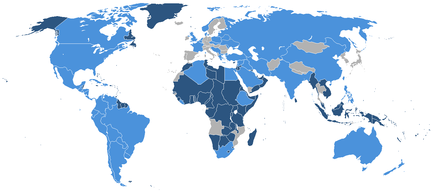
By 1 March 1945, 21 additional states had signed the Declaration by the United Nations.[31] After months of planning, the UN Conference on International Organization opened in San Francisco on 25 April 1945. It was attended by 50 nations' governments and a number of non-governmental organizations.[32][33][34] The delegations of the Big Four chaired the plenary meetings.[35] Previously, Churchill had urged Roosevelt to restore France to its status of a major power after the liberation of Paris in August 1944. The drafting of the Charter of the United Nations was completed over the following two months, and it was signed on 26 June 1945 by the representatives of the 50 countries.[36][37] The UN officially came into existence on 24 October 1945, upon ratification of the Charter by the five permanent members of the Security Council: the United States, the United Kingdom, France, the Soviet Union and China — and by a majority of the other 46 nations.[38]
The first meetings of the General Assembly, with 51 nations represented,[a] and the Security Council took place in London beginning in January 1946.[38] Debates began at once, covering topical issues such as the presence of Russian troops in Iranian Azerbaijan and British forces in Greece.[41] British diplomat Gladwyn Jebb served as interim secretary-general.
The General Assembly selected New York City as the site for the headquarters of the UN. Construction began on 14 September 1948 and the facility was completed on 9 October 1952. The Norwegian Foreign Minister, Trygve Lie, was elected as the first UN secretary-general (Jebb was only in the position until a permanent secretary-general was elected).[38]
Cold War (1947–1991)

Though the UN's primary mandate was peacekeeping, the division between the United States and the Soviet Union often paralysed the organization; generally allowing it to intervene only in conflicts distant from the Cold War.[42] Two notable exceptions were a Security Council resolution on 7 July 1950 authorizing a US-led coalition to repel the North Korean invasion of South Korea, passed in the absence of the Soviet Union,[38][43] and the signing of the Korean Armistice Agreement on 27 July 1953.[44]
On 29 November 1947, the General Assembly approved a resolution to partition Palestine, approving the creation of Israel.[45] Two years later, Ralph Bunche, a UN official, negotiated an armistice to the resulting conflict.[46] On 7 November 1956, the first UN peacekeeping force was established to end the Suez Crisis;[47] however, the UN was unable to intervene against the Soviet Union's simultaneous invasion of Hungary, following the country's revolution.[48]
On 14 July 1960, the UN established the United Nations Operation in the Congo (or UNOC), the largest military force of its early decades, to bring order to Katanga, restoring it to the control of the Democratic Republic of the Congo by 11 May 1964.[49] While travelling to meet rebel leader Moise Tshombe during the conflict, Dag Hammarskjöld, often named as one of the UN's most effective secretary-generals,[50] died in a plane crash. Months later he was posthumously awarded the Nobel Peace Prize.[51] In 1964, Hammarskjöld's successor, U Thant, deployed the UN Peacekeeping Force in Cyprus, which would become one of the UN's longest-running peacekeeping missions.[52]
With the spread of decolonization in the 1960s, the UN's membership shot up due to an influx of newly independent nations. In 1960 alone, 17 new states joined the UN, 16 of them from Africa.[47] On 25 October 1971, with opposition from the United States, but with the support of many Third World nations, the People's Republic of China was given the Chinese seat on the Security Council in place of the Republic of China (also known as Taiwan). The vote was widely seen as a sign of waning American influence in the organization.[53] Third World nations organized themselves into the Group of 77 under the leadership of Algeria, which briefly became a dominant power at the UN.[54] On 10 November 1975, a bloc comprising the Soviet Union and Third World nations passed a resolution, over strenuous American and Israeli opposition, declaring Zionism to be a form of racism. The resolution was repealed on 16 December 1991, shortly after the end of the Cold War.[55][56]
With an increasing Third World presence and the failure of UN mediation in conflicts in the Middle East, Vietnam, and Kashmir, the UN increasingly shifted its attention to its secondary goals of economic development and cultural exchange.[57] By the 1970s, the UN budget for social and economic development was far greater than its peacekeeping budget.
Post-Cold War (1991–present)
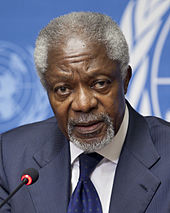

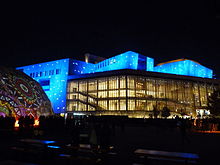
After the Cold War, the UN saw a radical expansion in its peacekeeping duties, taking on more missions in five years than it had in the previous four decades.[58] Between 1988 and 2000, the number of adopted Security Council resolutions more than doubled, and the peacekeeping budget increased by more than tenfold.[59][60][61] The UN negotiated an end to the Salvadoran Civil War, launched a successful peacekeeping mission in Namibia, and oversaw democratic elections in post-apartheid South Africa and post-Khmer Rouge Cambodia.[62] In 1991, the UN authorized a US-led coalition that repulsed Iraq's invasion of Kuwait.[63] Brian Urquhart, the under-secretary-general of the UN from 1971 to 1985, later described the hopes raised by these successes as a "false renaissance" for the organization, given the more troubled missions that followed.[64]
Beginning in the last decades of the Cold War, critics of the UN condemned the organization for perceived mismanagement and corruption.[65] In 1984, American President Ronald Reagan withdrew the United States' funding from the United Nations Educational, Scientific and Cultural Organisation (or UNESCO) over allegations of mismanagement, followed by the United Kingdom and Singapore.[66][67] Boutros Boutros-Ghali, the secretary-general from 1992 to 1996, initiated a reform of the Secretariat, somewhat reducing the size of the organisation.[68][69] His successor, Kofi Annan, initiated further management reforms in the face of threats from the US to withhold its UN dues.[69]
Though the UN Charter had been written primarily to prevent aggression by one nation against another, in the early 1990s the UN faced several simultaneous, serious crises within Somalia, Haiti, Mozambique, and the nations that previously made up Yugoslavia.[70] The UN mission in Somalia was widely viewed as a failure after the United States' withdrawal following casualties in the Battle of Mogadishu. The UN mission to Bosnia faced worldwide ridicule for its indecisive and confused mission in the face of ethnic cleansing.[71] In 1994, the UN Assistance Mission for Rwanda failed to intervene in the Rwandan genocide amidst indecision in the Security Council.[72]
From the late 1990s to the early 2000s, international interventions authorized by the UN took a wider variety of forms. The United Nations Security Council Resolution 1244 authorised the NATO-led Kosovo Force beginning in 1999. The UN mission in the Sierra Leone Civil War was supplemented by a British military intervention. The invasion of Afghanistan in 2001 was overseen by NATO.[73] In 2003, the United States invaded Iraq despite failing to pass a UN Security Council resolution for authorization, prompting a new round of questioning of the UN's effectiveness.[74]
Under the eighth secretary-general, Ban Ki-moon, the UN intervened with peacekeepers in crises such as the War in Darfur in Sudan and the Kivu conflict in the Democratic Republic of the Congo and sent observers and chemical weapons inspectors to the Syrian Civil War.[75] In 2013, an internal review of UN actions in the final battles of the Sri Lankan Civil War in 2009 concluded that the organization had suffered a "systemic failure".[76] In 2010, the organization suffered the worst loss of life in its history, when 101 personnel died in the Haiti earthquake.[77] Acting under the United Nations Security Council Resolution 1973 in 2011, NATO countries intervened in the First Libyan Civil War.
The Millennium Summit was held in 2000 to discuss the UN's role in the 21st century.[78] The three-day meeting was the largest gathering of world leaders in history, and it culminated in the adoption by all member states of the Millennium Development Goals (or MDGs), a commitment to achieve international development in areas such as poverty reduction, gender equality and public health. Progress towards these goals, which were to be met by 2015, was ultimately uneven. The 2005 World Summit reaffirmed the UN's focus on promoting development, peacekeeping, human rights and global security.[79] The Sustainable Development Goals (or SDGs) were launched in 2015 to succeed the Millennium Development Goals.[80]
In addition to addressing global challenges, the UN has sought to improve its accountability and democratic legitimacy by engaging more with civil society and fostering a global constituency.[81] In an effort to enhance transparency, in 2016 the organization held its first public debate between candidates for secretary-general.[82] On 1 January 2017, Portuguese diplomat António Guterres, who had previously served as the UN High Commissioner for Refugees, became the ninth secretary-general. Guterres has highlighted several key goals for his administration, including an emphasis on diplomacy for preventing conflicts, more effective peacekeeping efforts, and streamlining the organization to be more responsive and versatile to international needs.[83]
On 13 June 2019, the UN signed a Strategic Partnership Framework with the World Economic Forum in order to "jointly accelerate" the implementation of the 2030 Agenda for Sustainable Development.[84]
Structure
The United Nations is part of the broader UN System, which includes an extensive network of institutions and entities. Central to the organization are five principal organs established by the UN Charter: the General Assembly, the Security Council, the Economic and Social Council, the International Court of Justice and the UN Secretariat.[85] A sixth principal organ, the Trusteeship Council, suspended its operations on 1 November 1994 upon the independence of Palau; the last remaining UN trustee territory.[86]
Four of the five principal organs are located at the main UN Headquarters in New York City, while the International Court of Justice is seated in The Hague.[87] Most other major agencies are based in the UN offices at Geneva,[88] Vienna,[89] and Nairobi,[90] and additional UN institutions are located throughout the world. The six official languages of the UN, used in intergovernmental meetings and documents, are Arabic, Chinese, English, French, Russian and Spanish.[91] On the basis of the Convention on the Privileges and Immunities of the United Nations, the UN and its agencies are immune from the laws of the countries where they operate, safeguarding the UN's impartiality with regard to host and member countries.[92]
Below the six organs are, in the words of the author Linda Fasulo, "an amazing collection of entities and organizations, some of which are actually older than the UN itself and operate with almost complete independence from it".[93] These include specialized agencies, research and training institutions, programmes and funds and other UN entities.[94]
All organizations in the UN system obey the Noblemaire principle, which calls for salaries that will attract and retain citizens of countries where compensation is highest, and which ensures equal pay for work of equal value regardless of the employee's nationality.[95][96] In practice, the International Civil Service Commission, which governs the conditions of UN personnel, takes reference to the highest-paying national civil service.[97] Staff salaries are subject to an internal tax that is administered by the UN organizations.[95][98]
| UN General Assembly — Deliberative assembly of all UN member states — |
UN Secretariat — Administrative organ of the UN — |
International Court of Justice — Universal court for international law — | ||||
|
|
| ||||
| UN Security Council — For international security issues — |
UN Economic and Social Council — For global economic and social affairs — |
UN Trusteeship Council — For administering trust territories (currently inactive) — | ||||
|
|
| ||||
General Assembly

The General Assembly is the main deliberative assembly of the UN. Composed of all UN member states, the assembly meets in regular yearly sessions at the General Assembly Hall, but emergency sessions can also be called.[100] The assembly is led by a president, elected by the member states on a rotating regional basis, and 21 vice-presidents.[101] The first session convened on 10 January 1946 in the Methodist Central Hall in London and included representatives of 51 nations.[38]
When the General Assembly decides on important questions such as those on peace and security, admission of new members and budgetary matters, a two-thirds majority of those present and voting is required.[102][103] All other questions are decided by a majority vote. Each member has one vote. Apart from the approval of budgetary matters, resolutions are not binding on the members. The Assembly may make recommendations on any matters within the scope of the UN, except matters of peace and security that are under consideration by the Security Council.[100]
Draft resolutions can be forwarded to the General Assembly by its six main committees:[104]
- First Committee (Disarmament and International Security)
- Second Committee (Economic and Financial)
- Third Committee (Social, Humanitarian, and Cultural)
- Fourth Committee (Special Political and Decolonization)
- Fifth Committee (Administrative and Budgetary)
- Sixth Committee (Legal)
As well as by the following two committees:
- General Committee – a supervisory committee consisting of the assembly's president, vice-presidents, and committee heads
- Credentials Committee – responsible for determining the credentials of each member nation's UN representatives
Security Council

The Security Council is charged with maintaining peace and security amongst nations. While other organs of the UN can only make recommendations to member states, the Security Council has the power to make binding decisions that member states have agreed to carry out, under the terms of Charter Article 25.[105] The decisions of the council are known as United Nations Security Council resolutions.[106]
The Security Council is made up of fifteen member states: five permanent members (China, France, Russia, the United Kingdom and the United States) and ten non-permanent members (currently Algeria, Ecuador, Guyana, Japan, Malta, Mozambique, the Republic of Korea, Sierra Leone, Slovenia and Switzerland).[107] The five permanent members hold veto power over UN resolutions, allowing a permanent member to block adoption of a resolution, though not debate. The ten temporary seats are held for two-year terms, with five members elected each year by the General Assembly on a regional basis.[108] The presidency of the Security Council rotates alphabetically each month.[109]
UN Secretariat

The UN Secretariat carries out the day-to-day duties required to operate and maintain the UN system.[110] It is composed of tens of thousands of international civil servants worldwide and headed by the secretary-general, who is assisted by the deputy secretary-general.[111] The Secretariat's duties include providing information and facilities needed by UN bodies for their meetings and carrying out tasks as directed by the Security Council, the General Assembly, the Economic and Social Council, and other UN bodies.[112]
The secretary-general acts as the spokesperson and leader of the UN. The position is defined in the UN Charter as the organization's chief administrative officer.[113] Article 99 of the charter states that the secretary-general can bring to the Security Council's attention "any matter which in their opinion may threaten the maintenance of international peace and security", a phrase that secretaries-general since Trygve Lie have interpreted as giving the position broad scope for action on the world stage.[114] The office has evolved into a dual role of an administrator of the UN organization and a diplomat and mediator addressing disputes between member states and finding consensus to global issues.[115]
The secretary-general is appointed by the General Assembly, after being recommended by the Security Council, where the permanent members have veto power. There are no specific criteria for the post, but over the years it has become accepted that the position shall be held for one or two terms of five years.[116] The current secretary-general is António Guterres of Portugal, who replaced Ban Ki-moon in 2017.
| No. | Name | Country of origin | Took office | Left office | Notes |
|---|---|---|---|---|---|
| - | Gladwyn Jebb | 24 October 1945 | 2 February 1946 | Served as acting secretary-general until Lie's election | |
| 1 | Trygve Lie | 2 February 1946 | 10 November 1952 | Resigned | |
| 2 | Dag Hammarskjöld | 10 April 1953 | 18 September 1961 | Died in office | |
| 3 | U Thant | 30 November 1961 | 31 December 1971 | First non-European to hold office | |
| 4 | Kurt Waldheim | 1 January 1972 | 31 December 1981 | ||
| 5 | Javier Pérez de Cuéllar | 1 January 1982 | 31 December 1991 | ||
| 6 | Boutros Boutros-Ghali | 1 January 1992 | 31 December 1996 | Served for the shortest time | |
| 7 | Kofi Annan | 1 January 1997 | 31 December 2006 | ||
| 8 | Ban Ki-moon | 1 January 2007 | 31 December 2016 | ||
| 9 | António Guterres | 1 January 2017 | Incumbent |
International Court of Justice

The International Court of Justice (or ICJ), sometimes known as the World Court,[118] is the primary judicial organ of the UN. It is the successor to the Permanent Court of International Justice and occupies the body's former headquarters in the Peace Palace in The Hague, Netherlands, making it the only principal organ not based in New York City. The ICJ's main function is adjudicating disputes among nations. Examples of issues they have heard include war crimes, violations of state sovereignty and ethnic cleansing.[119] The court can also be called upon by other UN organs to provide advisory opinions on matters of international law.[120] All UN member states are parties to the ICJ Statute, which forms an integral part of the UN Charter, and non-members may also become parties. The ICJ's rulings are binding upon parties and, along with its advisory opinions, serve as sources of international law.[118] The court is composed of 15 judges appointed to nine-year terms by the General Assembly. Every sitting judge must be from a different nation.[120][121]
Economic and Social Council
The Economic and Social Council (or the ECOSOC) assists the General Assembly in promoting international economic and social co-operation and development.[122] It was established to serve as the UN's primary forum for global issues and is the largest and most complex UN body.[122] The ECOSOC's functions include gathering data, conducting studies and advising and making recommendations to member states.[123][124] Its work is carried out primarily by subsidiary bodies focused on a wide variety of topics. These include the United Nations Permanent Forum on Indigenous Issues, which advises UN agencies on issues relating to indigenous peoples, the United Nations Forum on Forests, which coordinates and promotes sustainable forest management, the United Nations Statistical Commission, which co-ordinates information-gathering efforts between agencies, and the Commission on Sustainable Development, which co-ordinates efforts between UN agencies and NGOs working towards sustainable development. ECOSOC may also grant consultative status to non-governmental organizations.[123] as of April 2021 almost 5,600 organizations have this status.[125][126]
Specialized agencies
The UN Charter stipulates that each primary organ of the United Nations can establish various specialized agencies to fulfill its duties.[127] Specialized agencies are autonomous organizations working with the United Nations and each other through the co-ordinating machinery of the Economic and Social Council. Each was integrated into the UN system through an agreement with the UN under UN Charter article 57.[128] There are fifteen specialized agencies, which perform functions as diverse as facilitating international travel, preventing and addressing pandemics, and promoting economic development.[129][b]






